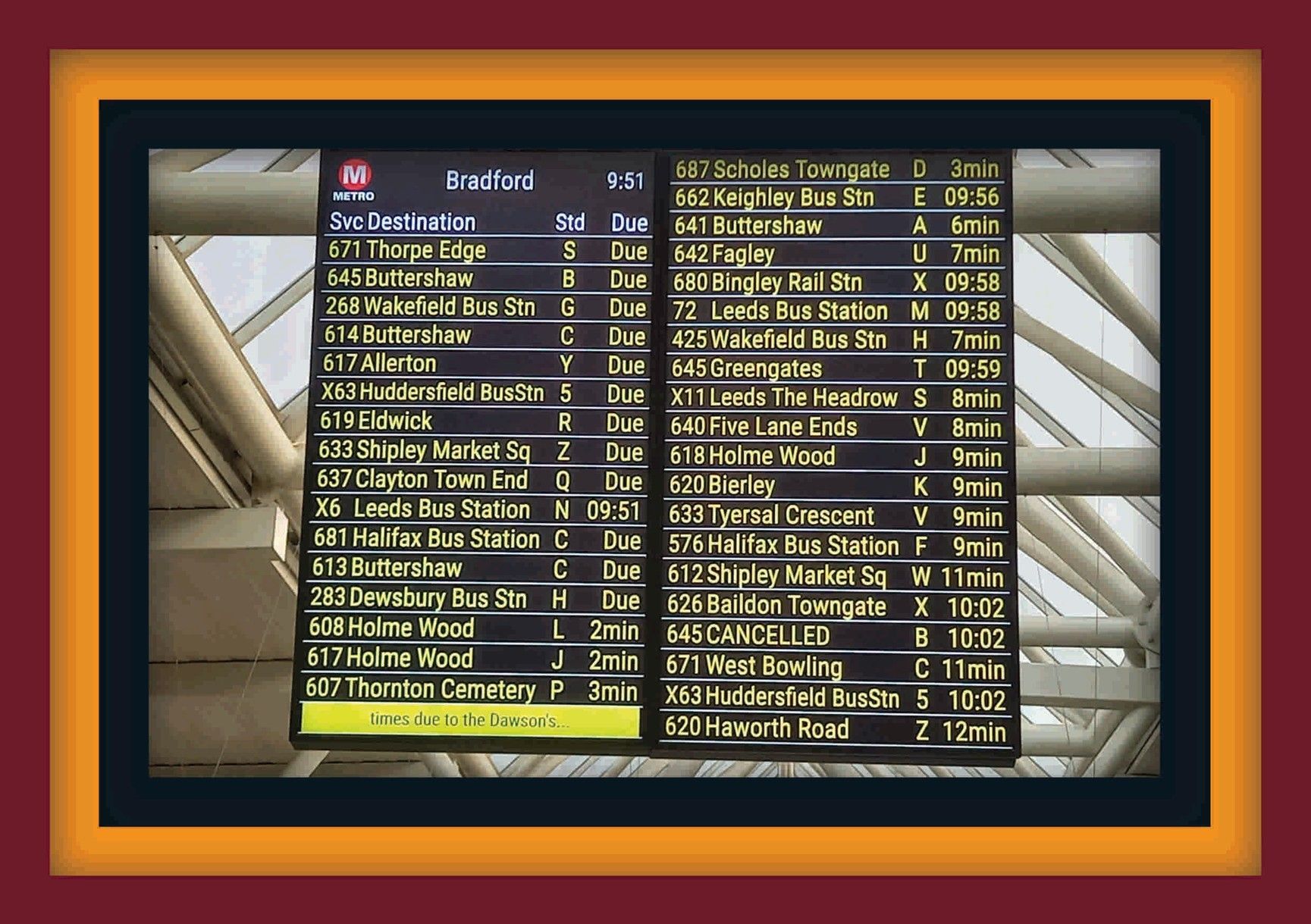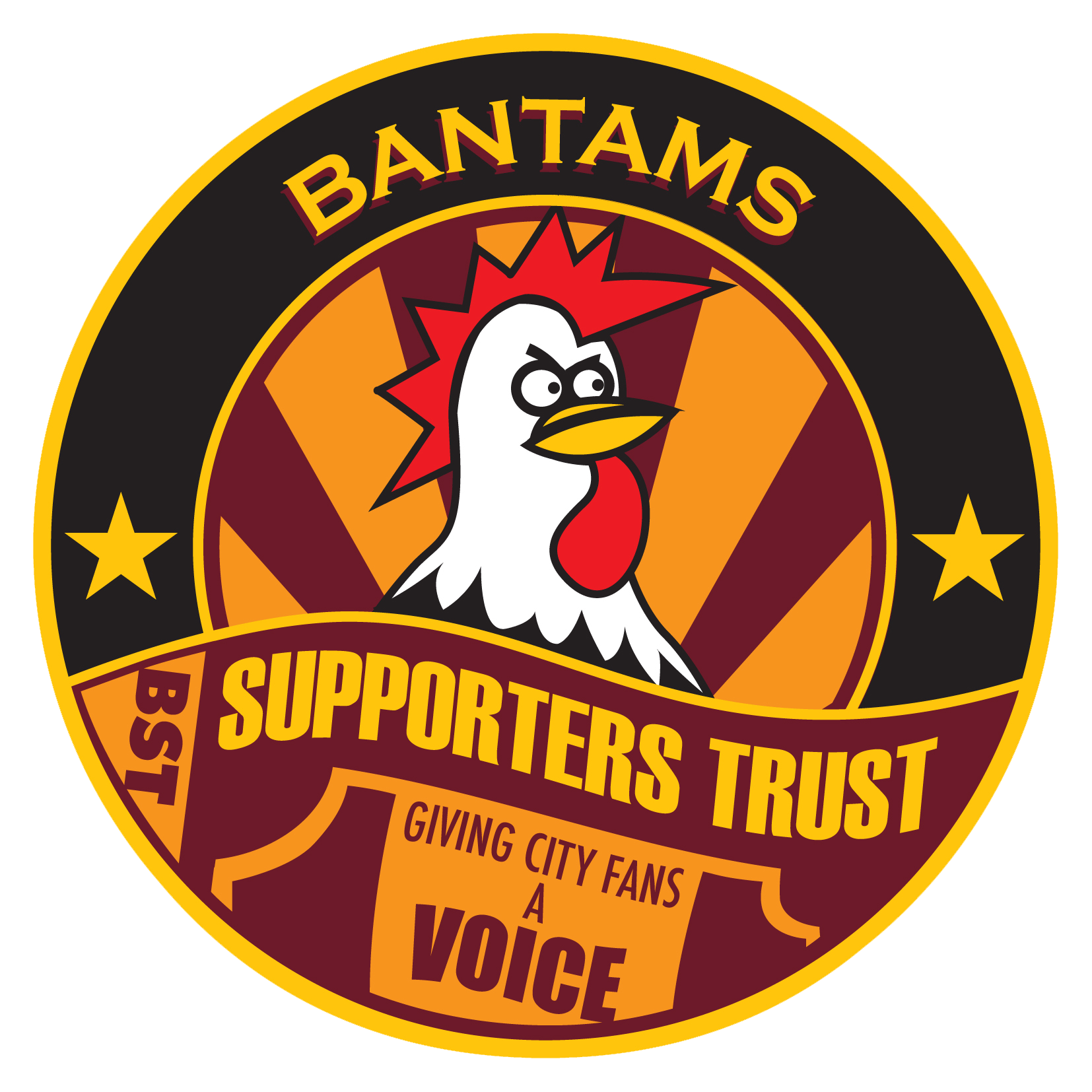October 14, 2025
This is the Chairs’ Report, written in October 25, ahead of our November AGM 2025, commenting on the promotion season and great start to this season on the pitch, as well as the national picture as a backdrop. It also covers our engagement with the Club, and all the work we have done amongst supporters linked to that. On the Pitch At the time of writing, the Bradford City team, are riding a crest of a wave. 2nd in the table after drawing level from being 2-0 down to get a point from the recent game against Rotherham United in a top verses bottom match, proved one of the most exciting games this season. City are 2 nd in the table with a game in hand as their home game against Lincoln City has been postponed due to Imps players receiving international call ups. Already we have beaten our West Yorkshire rivals Huddersfield Town at home 3-1, Cardiff City 3-1 and Championship sides Blackburn Rovers and Stoke City, 2-1, and 3-0 respectively in the League Cup. We valiantly lost to Premier League Newcastle in the 3 rd round, but Andy Cook scored our consolation goal against the team he supported as a kid. It is an amazing season so far, and many fans have returned to watch, with lots of new, younger supporters witnessing a new look, determined and confident Bantams side. The attendance against Huddersfield broke a new record with 24,075 at Valley Parade (in the modern stadium). In May the Bantams finally got promoted on the last match of the season in front of 24,033 – a record at the time, in the dying throes of injury time against Fleetwood Town. Valley Parade became alive with celebration after seeing Antoni Sarcevic redirect a George Lapslie shot into the bottom corner of the net, which led to scenes of unbridled joy, a pitch invasion, and much celebration on North Parade amongst fans and players. During last season, we started spritely, but we were inconsistent. We really started to pick up in December of last year. And we were unbeaten in 10 home league games. It was a huge improvement on the previous season but few could’ve predicted automatic promotion. It was Graham Alexander’s first full season in charge. This season, with a lot more investment in the squad than in previous years, our team is certainly capable of much more success at our new League One level. At last supporters feel a sense of pride that players are putting the effort in, playing as a team and getting the wins as a result. It is coming up to Alexander’s 2 nd year at Bradford City. Lets up that we can maintain the momentum well into his second year and keep it going until the end of the season, and hopefully the efforts on the pitch will reap the reward of another promotion. The Football Governance Bill update The Football Governance Bill finally became an act of Parliament over the summer, on the 21 st of July this year, and with it, the royal assent brought the introduction of the Independent Regulator. The first version of the Football Governance Bill was tabled in 2024, following the Fan-led Review of Football Governance which was launched in the immediate aftermath of elite clubs across the continent trying to form a European Super League. The Football Supporters Association (FSA) has long argued that football can no longer regulate itself as so many clubs were going to the wall, and that a review of football’s finances was long overdue. As far back as 2012/13 the national fans’ organisation had submitted evidence to a Culture, Media and Sport Committee investigation endorsing far stronger rules on club licensing, ownership and protection of assets outlining why “the regulated should not control the regulator”. Our Supporters Trust was one of those Trusts involved in submitting evidence around that time to the government’s Expert Working Group (EWG) on football governance. We made a presentation about the Supporters Board. This amongst all the evidence gathered, was published in 2016, and it encouraged the EWG to recommend something called ‘structured dialogue’ between clubs and their fans. These recommendations were subsequently adopted by the Premier League and the EFL as a requirement for all clubs. Following Bury FC’s collapse in 2019 the FSA put forward a wide range of proposals to the FA to protect our professional clubs – and this included the concept of a regulator for football. Fast forward a couple of years and more clubs at lower levels of the game teetered on the brink while billionaire owners tried to stitch up the game for their own benefit – and the Government was eventually left with no choice but to pick up the reins. The FSA’s list of proposed solutions called for a licensing system which removes the conflict of interest arising from club owners regulating themselves. The licensing system will now be put in place by the regulator along with a whole raft of recommendations that are very heavily based on the FSA’s proposals to the FA, representing a remarkable victory for supporters in shaping the direction of the game. In those proposals the FSA argued for better tests of “fitness” for club owners and directors, protection for “heritage” items, rules to prevent clubs being relocated without supporter approval and bans on “leveraged” buyouts which burden clubs with debt. The FSA also argued in favour of the concept of “stewardship”, with owners being custodians on behalf of fans who will be there long after a current ownership regime has gone – an idea which is now widely understood and accepted. For more info on what the Football Governance Act is about please see here . The year’s work Like previous years, there is always something to keep on top of. It is very demanding. Our three key things that we do best are: Keeping members informed and in the loop about we are doing and keeping you up to date as much as we can to what is going on nationally with our email articles, which we post on social media. Physically engage with members and supporters through our stalls on match days in the stadium. Engage with the Club through our ‘Structured Dialogue’, and of course keep members and supporters informed with what we have discussed and what comes out of the meetings. Commercial relationships Teemill We continue to work with Teemill, a UK based, ethically sourced company. We have samples of our designed clothing on our stall and we regularly promote it with an advert on social media and on a join leaflet which we produce every season. We now include a QR code on our advert that takes members and supporters directly to the online store: https://bantams-supporters-trust.teemill.com/ where supporters can buy our products. There is no investment costs with this, but if it does prove popular the income we get with each sale of merch sold could finance any upgrade to have more choice in terms of stylization, so for example merch such as T-shirts and hoodies could have back printing. Scarves Last year, in September 24 began to work with Arena Scarves Ltd. who produced 50 ‘away’ white retro scarves and 50 ‘home’ claret and amber retro style scarves both in the jacquard knit design. Arena Scarves are Leicester based. The claret and amber ones have been so popular that we are having to re-order more, and before long we will be soon out of the white ones to, so we are in the process of ordering some more of them too. Our publicity and website We continue to try and bring members and supporters a good mix of mix of news about what we are doing and national news that can have a direct Impact or indirect impact on supporters as the season takes it’s course. Over the last year we have brought you regular updates about the Football Governance and improvements in terms of how Clubs are meant to engage with supporters, and we’ve brought you informed detail about the Sky TV deal rights and fixture rearrangements. Some of this detail can be necessary info added from discussions with the Club through our engagement with the Club, such as our structured Dialogue meetings with Ryan Sparks. And at the end of August the Trust met with Paula Watson, the Director of Operations, Jonathan Heaton, the Club’s Safety Officer and Aaron Dennis the Dedicated Football Officer from West Yorkshire Police to discuss changes to the Sanctions and Bannings Policy and poor behavior at two key matches. This was due to new ways the EFL have been working in these areas, and these are linked to the proposed ways of working advised by the FSA at a senior structured dialogue level between EFL and our national fans’ organization. Some of our news may promote community work such as the Foodbank event organized by Accrington Stanley Trust colleagues last April, or community events and exhibitions such as the Community event at VP that had an immersive igloo, explore with a digital copy of the University of Bradford Stadium, or the Football fanzine exhibition at Leeds Central Library which had our very own City Gent fanzine displayed and the editor, Mike Harrison was among other editors and writers speaking at that exhibition event last June. And of course we informed you that the Council approved our application for the Stadium to be an Asset of Community Value in June 24 and in July BBC’s Look North did a story on this piece of news and featured prominent City supporters. And we cannot forget to mention we always publicise our annual organising to get a turn-out for volunteers for the Burns Unit collection, and this year we were guests of the Council at the annual memorial in Centenary Square on Sunday 11 th May this year. Our members get our emails, and there is always a trace of our work so that members can look up or go back to articles. The emails get sent to over 500 members and it is a free service. All our articles and meetings with the club are on our website. It is very easy to get around. You can find out what we are about, how we were formed and our policies. Trust Board meeting minutes and our AGM’s are also on there. On Social media City supporters can just see a strapline and link to our articles, and we regularly share on multiple groups with the help of the Meta Business Suite and we continue to use twitter of ‘X’ as it is now called. And we continue to reach Instagram too. Our profile on these social media channels has grown and we are much larger than life because of the frequency of posting. If it is not for posting links to articles, often with an image / design in our Trust box, it is our regular well wishing prior to matches regularly asking poignant questions relating to form and record of results and immediate challenges. These get the most ‘likes’. These have the retro scoreboard C’mon City clap graphics. Our Facebook Group has 924 members, up by 43 from this time last year and our ‘Followers’ Page has 1,689 people following us, up by 117 on last year. Our Twitter /X account, https://twitter.com/bantamstrust, has 401 Following , up 7, and 291 Followers , up by 4. We do have an Instagram site with 76 following on that. Our presence on social media has definitely grown and we have shown to be consistent in our approach to what we do. Concourse stalls in the Main Stand Now in our fifth season, the Trust stall on matchdays is still going! Situated in the main stand, we set up from between 1.30pm and 2pm on a Saturday. It is difficult because we are not there every week due to work commitments, but even so, we definitely have established a firm base of friendly faces that stop and chat and discuss their concerns and put a few quid in the donations tin. Due to the success of the team this season, the crowds on the concourse are much bigger so we are seeing a newer layer of supporters seeing the stall for the first time and at the same time seeing what we have on the stall for sale. It does get very busy and there are times when there are a lot of people around the table waiting to be seen. One thing we have been able to do this season, with a little bit of help, is to venture out in other areas of the ground just to give our leaflets out. We have just started to do this and hopefully it will pay off with people joining online. Fan Engagement / Structured Dialogue During the last Financial Year we have held three meetings with CEO Ryan Sparks: in November 24 , and then February 25 , and August 25 . It is always work in progress and developments within the Club are always at pace, so we are often playing catch-up in what is always a movable feast. Themes covered through these meetings were: Matchday experience , including Fanzone, atmosphere section, stewarding home and away. Railed seating Season tickets prices and sales , loyalty points and limited capacity at away grounds as well as matchday ticket pricing and special offers for struggling people. Environmental sustainability including improving public transport Restorative Justice – discussing how the Club deal with and support troublesome supporters seeing the error of their ways. Community building and Diversity projects – finding ways to work with the Club supporting community projects. Other core agenda items: Aspects of the Football Governance Bill/Act. Improving our Structured Dialogue – improving the Clubs’ fan engagement. Finances – what we need to spend on the stadium and pitch (maintenance costs) and investment from promotion and the Sky Deal extra income. Ownership – The importance of seeing Stefan Rup as improving the Clubs’ fan engagement. Important achievements for the Trust Yearly meetings with the Club and Police regarding practices around stewarding and policing and any changes to sanctions policy and details about what the Club’s restorative justice practices involve. Now that the ground is registered as an Asset of Community Value (ACV) in July of this year we met with Naz Shah MP to explore if there is a covernant to further protect the stadium. In May we played an important part in getting volunteers to do the bucket collection, raising £7,387.70 ahead of the Fleetwood game on the 3 rd May, nearly double what was raised the previous year. In March we consulted with supporters about the Club’s Early Bird Season Ticket price rise . Membership We now have 995 contacts that we have on our InTouch database, an increase of 11 this time last year (2024), and the email membership figure now stands at 508, a reduction of 6. We have a total of 290 ‘suppressed’ contacts (an increase of 18 on last year (2024) that we have to go through and identify – This list covers all contacts whose emails have bounced – this could be because they have changed their email addresses, or indeed passed away. It covers members who have unsubscribed or indeed members who have no other contact details. This increase is lower than it was last year (272). Whilst our membership is respectable, we still need to increase the membership in order to represent a wider and more diverse support base the Club has. We have made it easier to join than ever before, from when people can enter the website on their phones to the links on social media to our articles, there is always an option to join, and supporters can still pay their membership or renew via paypal and bank transfer by going to ‘ Membership Cost’ The Trust Board We continue to meet regularly, there is a familiar pattern in that it continues to be difficult in getting everyone available to meet at the same time. This makes it more pressing that we need more people interested in joining the Trust and getting involved and playing a role on the board. With more board members we can reach out more and be a bigger influence. You don’t have to live in Bradford to attend meetings. You can attend meetings on ‘Teams’ (we have had to change from Skype to Teams as Microsoft has dropped Skype) and play a role but living in the West Yorkshire area would help as we need more hands to maintain and expand our work. If you fancy it get in touch via hello@bantamstrust.co.uk . Whilst the Trust as a larger than life presence, as a board, looking to the future, we do need to develop a new generation of Trust activists replenishing the existing board, who do the best that they can give at the present time. The Trust is a democratic and independent organisation, and the only body of City fans that is part of a wider Supporters Trust movement on a national scale. We can act as a critical friend of the Club and as a collective campaigning force that can be organised into action. To realise this potential, we need more fans to join and get involved.












